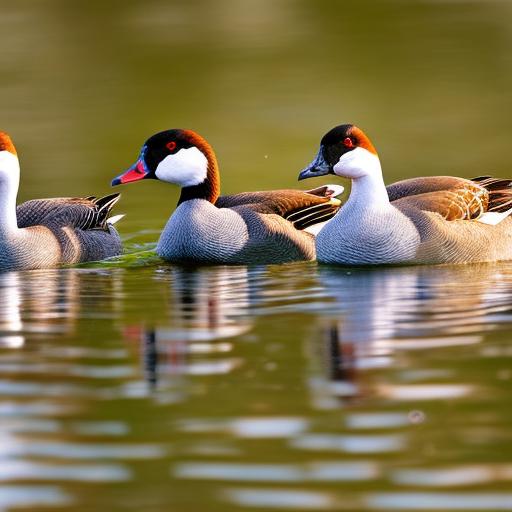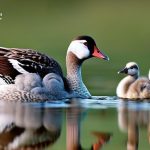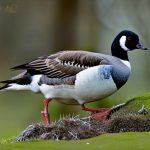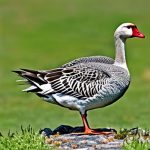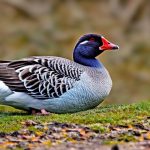Using swans as a natural deterrent for geese has become an increasingly popular method in recent years. This method involves introducing swans to an area to deter geese from nesting or feeding. Swans are naturally territorial birds and will defend their territory against other birds, including geese. Their presence alone can be enough to keep geese away, making them a more natural and sustainable option compared to artificial deterrents. However, proper care and management of the swans is crucial to ensure their effectiveness in deterring geese.
Key Takeaways
- Swans can be used to keep geese away due to their natural territorial behavior.
- Using swans as a natural deterrent for geese has several benefits over artificial deterrents.
- Proper swan care and management is crucial for effective geese control.
- Swans can be effective in different environments such as parks and golf courses.
- There are potential drawbacks and challenges to using swans for geese control, and alternatives exist.
The Natural Territorial Behavior of Swans
Swans are known for their territorial behavior, especially during the breeding season. They establish and defend their territory against other birds, including geese. Swans will aggressively chase away any intruders that come too close to their nesting area or feeding grounds. This territorial behavior is instinctual and serves as a way for swans to protect their young and ensure their survival.
When it comes to geese, swans are particularly effective at keeping them away. Geese are generally less aggressive than swans and will often yield to the larger and more assertive birds. Swans will chase geese away from their territory, preventing them from nesting or feeding in the area. This natural behavior makes swans an ideal choice for geese control.
How Swans Can Be Used as a Natural Deterrent for Geese
To use swans as a natural deterrent for geese, they can be introduced to an area where geese are causing problems. The presence of swans alone can be enough to keep geese away, as they will recognize the territorial nature of the swans and avoid confrontation. Swans can be placed in ponds, lakes, or other bodies of water where geese tend to congregate.
It is important to note that introducing swans to an area should be done carefully and with proper planning. Swans require specific habitat conditions and should be provided with adequate food and shelter. They also need to be monitored and managed to ensure their well-being and effectiveness in deterring geese. Proper care and management of the swans is crucial for the success of this method.
The Benefits of Using Swans Instead of Artificial Deterrents
Using swans as a natural deterrent for geese offers several advantages over other methods, such as noise makers or fake predators. Firstly, swans are a more natural option compared to artificial deterrents. They rely on their instinctual behavior to keep geese away, rather than relying on human intervention or technology. This makes them a more sustainable choice for geese control.
Additionally, swans can provide aesthetic value to an area. Their graceful presence can enhance the beauty of parks, golf courses, and other public spaces. Swans are often seen as symbols of elegance and tranquility, adding to the overall ambiance of the environment.
Furthermore, swans are generally more effective at deterring geese compared to artificial deterrents. Geese are more likely to recognize and respect the territorial behavior of swans, leading them to avoid areas where swans are present. This natural deterrent can be more successful in keeping geese away compared to noise makers or fake predators, which may lose their effectiveness over time.
The Importance of Proper Swan Care and Management for Effective Geese Control
Proper care and management of swans is crucial for their effectiveness in deterring geese. Swans require specific habitat conditions, including access to clean water, suitable vegetation for feeding, and adequate shelter for nesting. They also need a balanced diet that includes both aquatic plants and supplemental feed.
In addition to providing the necessary habitat conditions, swans should be monitored and managed by trained professionals. These professionals can ensure that the swans are healthy, well-fed, and free from any diseases or parasites. They can also handle any potential conflicts or issues that may arise, such as aggressive behavior towards humans.
Without proper care and management, swans may not be as effective in deterring geese. They may become stressed or unhealthy, which can impact their ability to defend their territory. Therefore, it is important to invest in the proper care and management of swans to ensure their effectiveness in geese control.
The Effectiveness of Swans in Different Environments (Parks, Golf Courses, etc.)

Swans can be effective in a variety of environments, including parks, golf courses, and other public spaces. Their territorial behavior and presence alone can deter geese from nesting or feeding in these areas. However, the effectiveness of swans may vary depending on the specific location and situation.
In parks, swans can be particularly effective at keeping geese away from areas where people gather. Geese can be a nuisance in parks, leaving behind droppings that can create unsightly and unsanitary conditions. The presence of swans can deter geese from congregating in these areas, making parks more enjoyable for visitors.
Similarly, golf courses often struggle with geese problems. Geese can damage the turf and create hazards for golfers. By introducing swans to golf courses, geese can be deterred from nesting or feeding on the course. This can help maintain the quality of the turf and improve the overall playing experience for golfers.
Potential Drawbacks and Challenges of Using Swans for Geese Control
While using swans as a natural deterrent for geese offers many benefits, there are also potential drawbacks and challenges to consider. One of the main challenges is the cost of care and management. Properly caring for swans requires resources and expertise, which may not be feasible for all locations or organizations.
Another potential challenge is the potential for swans to become aggressive towards humans. Swans can be protective of their territory and may display aggressive behavior if they feel threatened. This can pose a risk to people who come into contact with the swans, especially if they are not familiar with their behavior. Therefore, it is important to educate the public about swans and their territorial nature to prevent any conflicts or injuries.
Alternatives to Swans for Geese Control
While swans can be an effective method for geese control, there are also alternative methods that can be considered. One alternative is the use of border collies to herd geese away. Border collies are highly intelligent and trainable dogs that can be trained to chase geese away without causing harm. This method is particularly effective in open areas such as golf courses or large parks.
Another alternative is habitat modification. By modifying the habitat to make it less attractive to geese, such as removing food sources or altering the landscape, geese can be discouraged from nesting or feeding in the area. This method requires careful planning and implementation, but can be effective in reducing geese populations.
Each alternative method has its own pros and cons, and the choice of method will depend on the specific situation and location. It is important to carefully consider the advantages and challenges of each method before deciding on the most appropriate approach for geese control.
Case Studies of Successful Swan-Based Geese Control Programs
There have been several successful swan-based geese control programs implemented in different locations. One example is the program implemented in Central Park in New York City. Swans were introduced to the park to deter geese from nesting and feeding on the lawns. The presence of swans has significantly reduced the number of geese in the park, improving the overall cleanliness and enjoyment of the park for visitors.
Another example is the program implemented at a golf course in Scotland. Swans were introduced to the course to deter geese from damaging the turf and creating hazards for golfers. The presence of swans has successfully kept geese away from the course, allowing for better playing conditions and a more enjoyable golfing experience.
In each case study, proper care and management of the swans were crucial for their effectiveness in geese control. Trained professionals were responsible for monitoring and managing the swans, ensuring their well-being and ability to defend their territory.
Conclusion and Recommendations for Using Swans to Keep Geese Away
Using swans as a natural deterrent for geese offers many benefits, including their territorial behavior, aesthetic value, and effectiveness in deterring geese. However, proper care and management of the swans is crucial to ensure their effectiveness and well-being.
For those considering using swans for geese control, it is recommended to invest in the necessary resources and expertise to properly care for and manage the swans. This includes providing suitable habitat conditions, monitoring their health and behavior, and handling any potential conflicts or issues that may arise.
Additionally, it is important to educate the public about swans and their territorial nature to prevent any conflicts or injuries. By raising awareness about swans and their role in geese control, people can better understand and appreciate their presence in public spaces.
In conclusion, using swans as a natural deterrent for geese can be an effective and sustainable method for geese control. With proper care and management, swans can help maintain the cleanliness and enjoyment of parks, golf courses, and other public spaces. By considering the benefits and challenges of using swans, organizations can make informed decisions about the most appropriate approach for geese control in their specific location.
If you’re interested in learning more about how swans can effectively keep geese away, you might find this article on Poultry Wizard quite informative. It provides valuable insights on how to care for goslings, which is essential knowledge for anyone considering breeding geese. Understanding the proper care and nurturing of goslings is crucial in maintaining a healthy and thriving flock. To delve deeper into this topic, check out the article here: https://poultrywizard.com/breeding-geese/how-to-care-for-goslings/.
FAQs
What is the article about?
The article is about how swans can keep geese away from certain areas.
Why do geese need to be kept away?
Geese can cause damage to property and can be aggressive towards humans. They also leave behind large amounts of droppings which can be unsanitary.
How do swans keep geese away?
Swans are territorial and will aggressively defend their territory against other waterfowl, including geese. Their presence alone can be enough to deter geese from entering an area.
Are there any downsides to using swans to keep geese away?
Swans can also be aggressive towards humans and other animals, so caution should be taken when introducing them to an area. Additionally, swans can be expensive to purchase and maintain.
What are some other methods for keeping geese away?
Other methods include using decoys, applying repellents, and modifying the environment to make it less attractive to geese. Some people also use trained dogs to chase geese away.
Meet Walter, the feathered-friend fanatic of Florida! Nestled in the sunshine state, Walter struts through life with his feathered companions, clucking his way to happiness. With a coop that’s fancier than a five-star hotel, he’s the Don Juan of the chicken world. When he’s not teaching his hens to do the cha-cha, you’ll find him in a heated debate with his prized rooster, Sir Clucks-a-Lot. Walter’s poultry passion is no yolk; he’s the sunny-side-up guy you never knew you needed in your flock of friends!

